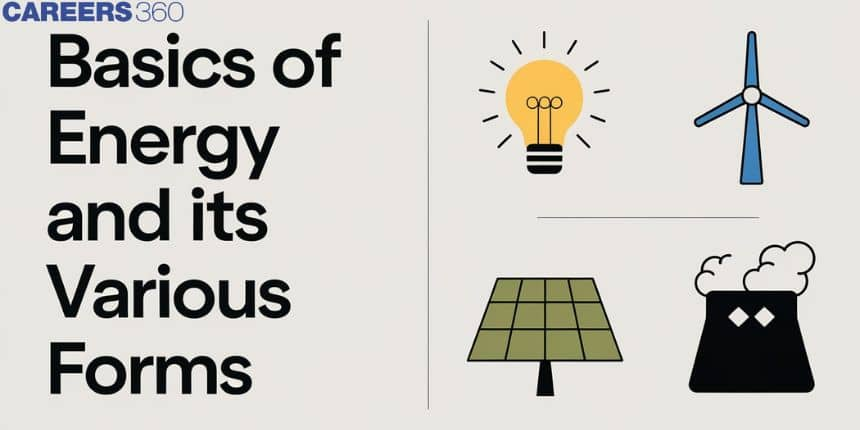Basics Of Energy And Its Various Forms
Energy is a fundamental concept that powers every aspect of our lives, from the simplest actions to the most complex technological advancements. It is the capacity to do work, driving the motion of objects, enabling the functioning of machines, and sustaining life itself. Energy exists in various forms, such as kinetic, potential, thermal, electrical, and chemical energy, each playing a unique role in our daily activities. For instance, when you cycle up a hill, your muscles convert chemical energy from food into kinetic energy, propelling you forward, while your body gains potential energy due to its elevated position. Understanding the basics of energy, work, and power is essential, as these principles govern everything from the movement of celestial bodies to the functioning of household appliances, highlighting their relevance in both natural and human-made systems.
This Story also Contains
- Energy
- Solved Examples Based on Basics of Energy and Its Various Forms
- Summary

Energy
Energy is defined as the capacity or ability to do work. It exists in various forms, such as kinetic energy, potential energy, thermal energy, and more. Energy can be transferred from one object to another or transformed from one form to another, but it cannot be created or destroyed, as stated by the law of conservation of energy.
It is a scalar quantity
Dimension- $M L^2 T^{-2}$
Unit
SI unit - Joule
CGS - Erg
and, 1 Joule $=10^7$ Erg
Mass Energy Equivalence
Einstein’s special theory of relativity shows that material particle itself is a form of energy.
The relation between the mass of a particle m and its equivalent energy is given as
$
E=m c^2
$
Where $\mathrm{c}=$ velocity of light in vacuum.
E.g - If $\mathrm{m}=1 \mathrm{~kg}$ then $E=9 * 10^{16} \mathrm{~J}$
Various Forms of Energy
Mechanical energy (Kinetic and Potential)
Chemical energy
Electrical energy
Sound energy
Heat energy
Light energy
Transformation of Energy
Conversion of energy from one form to another is possible through various devices and processes.
Examples are - Bulb- Electrical energy gets converted into light energy.
Speaker-Electrical energy gets converted into sound energy.
Heater- Electrical energy gets converted into heat energy
Recommended Topic Video
Solved Examples Based on Basics of Energy and Its Various Forms
Example 1: What is the standard unit of measurement for energy in physics?
1) Ampere
2) Volt
3) Joule
4) Watt
Solution:
Energy
SI unit - Joule
CGS - Erg
The standard unit of measurement for energy in physics is Joule.
Hence, the answer is the option (3).
Example 2: The commercial unit of Energy is:
1) Watt
2) Watt-hour
3) Kilowatt
4) kilowatt-hour
Solution:
The relationship between electrical energy and electric power is-
Energy= power $\times$ time
Unit of power- watt or Joule/sec
The commercial unit of energy is the kilowatt-hour. It is defined as the electrical energy consumed when 1 kilowatt of power is used for 1 hour.
Hence, the answer is the option (4).
Summary
Energy is the capacity to do work and exists in various forms, such as kinetic, potential, thermal, and electrical. It is a scalar quantity measured in joules (SI unit) or ergs (CGS unit). Energy can transform between forms, like electrical to light in a bulb or electrical to sound in a speaker. The commercial unit of energy is the kilowatt-hour, representing the energy consumed by using 1 kilowatt of power for 1 hour.
